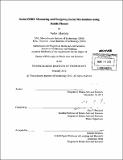| dc.contributor.advisor | Alex P. Pentland. | en_US |
| dc.contributor.author | Aharony, Nadav | en_US |
| dc.contributor.other | Massachusetts Institute of Technology. Dept. of Architecture. Program in Media Arts and Sciences. | en_US |
| dc.date.accessioned | 2012-05-15T21:14:02Z | |
| dc.date.available | 2012-05-15T21:14:02Z | |
| dc.date.copyright | 2012 | en_US |
| dc.date.issued | 2012 | en_US |
| dc.identifier.uri | http://hdl.handle.net/1721.1/70807 | |
| dc.description | Thesis (Ph. D.)--Massachusetts Institute of Technology, School of Architecture and Planning, Program in Media Arts and Sciences, 2012. | en_US |
| dc.description | Cataloged from PDF version of thesis. | en_US |
| dc.description | Includes bibliographical references (p. 157-168). | en_US |
| dc.description.abstract | A key challenge of data-driven social science is the gathering of high quality multi-dimensional datasets. A second challenge relates to the design and execution of social experiments in the real world that are as reliable as those within a controlled laboratory, yet yield more practical results. We introduce the Social Functional Mechanism-design and Relationship Imaging, or "SocialfMRI" - an approach that enhances existing computational social science methodologies by bridging rich data collection strategies with experimental interventions. In this thesis, we demonstrate the value of the Social fMRI approach in our Friends and Family study. We transformed a young-family residential community into a living laboratory for 15 months, through a very fine-grained and longitudinal data collection process combined with targeted experimental interventions. Through the derived dataset of unprecedented quality, the Social fMRI approach allows us to gain insights into intricate social mechanisms and interpersonal relationships within the community in ways not previously possible. This thesis delivers the following contributions: (1) A methodology combining a rich-data experimental approach together with carefully designed interventions, (2) a system supporting the methodology - implemented, field-tested, and released to the world as an open-source framework with a growing community of users, (3) a dataset collected using the system, comprising what is, to date, the richest real-world dataset of its genre, (4) a very large set of experimental findings that contribute to our understanding of important research questions in computational social science in addition to demonstrating the methodology's potential. Among the results described in this thesis are the design and evaluation of a novel mechanism for social support in a health-related context, the observation that the diffusion of mobile applications relies more on the face-to-face interaction ties than on self-perceived friendship ties, and a gained understanding of the evolution of modeling and prediction processes over time and varying sample sizes. | en_US |
| dc.description.statementofresponsibility | by Nadav Aharony. | en_US |
| dc.format.extent | 168 p. | en_US |
| dc.language.iso | eng | en_US |
| dc.publisher | Massachusetts Institute of Technology | en_US |
| dc.rights | M.I.T. theses are protected by
copyright. They may be viewed from this source for any purpose, but
reproduction or distribution in any format is prohibited without written
permission. See provided URL for inquiries about permission. | en_US |
| dc.rights.uri | http://dspace.mit.edu/handle/1721.1/7582 | en_US |
| dc.subject | Architecture. Program in Media Arts and Sciences. | en_US |
| dc.title | Social fMRI : measuring and designing social mechanisms using mobile phones | en_US |
| dc.title.alternative | Measuring and designing social mechanisms using mobile phones | en_US |
| dc.type | Thesis | en_US |
| dc.description.degree | Ph.D. | en_US |
| dc.contributor.department | Program in Media Arts and Sciences (Massachusetts Institute of Technology) | |
| dc.identifier.oclc | 792944714 | en_US |
